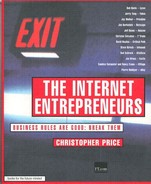Rapid growth for Netscape
Barksdale hit the ground running. He knew that the success of the Netscape browser depended on getting it out to market as quickly and as extensively as possible. However, the threat from Microsoft soon became apparent:
5 ways… Jim Barksdale broke the rules
|
'The week I arrived, we released our first commercial product, distributing it over the internet. But it became obvious over the next six to nine months that Microsoft had very different plans for this. They caught on to what the potential of this new platform was, they knew they didn't want it to stay independent and in business.
'Gates said in an interview in '95, if we give away our browser, we still have the revenues from our other products. If Netscape gives away its browser, what else have they got to charge for? I later confronted Bill about that quote in front of a US senate hearing and he said he was misquoted.
'But the point was the business was just starting. By the time I got here we had 100 people, and had already released the first product, although we had no revenue. And then in the first quarter we had $2 or $3 million revenue, the next quarter $8 million, the next $20 million, the next $40 million - we were the fastest growing revenue engine the world had ever seen.
'A lot of people don't know that about Netscape - we were profitable by our third quarter. By the time we were at full run, we were doing $600 million a year. That was more than companies like Yahoo hit after several years in business.'
Barksdale's purpose at the company was to bring a level of direction and control:
'Well we joke about adult supervision, but I was able to get the team to work together, define what it was we were going to be and what we weren't going to be, what our market was, how deep it was, how wide it was, what was addressable, how do you go after it, how do you set your mission, how do you promote yourself, how do you hire great people, how do you budget and finance, how do you raise capital.'
While many of these were skills he had built up over his years in business, there was one thing that caught Barksdale completely by surprise - the incredible growth of the business. He recalls:
The rapid growth of Netscape meant that conventional business rules no longer applied
'It was exploding around us. There's no amount of experience that can prepare you for that kind of thing.
'All I could do was to try to establish some rules as to how we were going to operate so we didn't get lost and ahead of our supply wagons.
'For example - one of the things that bothered me when I first got there - they loved to make a decision one week then come back a week later and go back over it. I said: "Stop this." The first rule is - if you see a snake kill it. Don't call committees.
'The second rule is - don't go back and play with dead snakes. Don't waste your time on things that you've already decided. Even if it's wrong, we're just going to keep on going.
'The third rule is that all opportunities start out looking like snakes. Some of the hardest things to do, if you can do them, are the greatest opportunities.'
The rapid growth of Netscape meant that conventional business rules no longer applied:
'We came up with a whole new way of budgeting a business that I'd experienced before - because it was obvious we had to do something.
'I said, if you have this many sales this quarter this'll be your expense budget next quarter, rather than coming up with year-long budgets and so forth which I had historically done.
'We did these short budgets because we were at risk of letting our own prejudices, backgrounds and pasts tell us how fast the business should grow.
'My fear was that our own lack of imagination would stifle the growth. So I said let's just let it grow as fast as it'll grow. We'll figure out how to pay for it later.
'So we did it on the basis that that month's sales budget was next month's expenditure budget because if you're growing you can do that and the difference between one quarter and the next becomes your margin. That worked, but I'd never seen that done before.
'We decided to let it rip. This was summer 1995, and we were starting to get a lot of interference from Microsoft who were determined not to let this thing succeed.
'Despite all that, we became very good and productive at exploiting opportunities - selling the first major internet and intranet software that businesses put in in the world, for example.
'We grew the business into an international one within six months of being here. We built a whole new division that built application software, grown in our first year to maybe 900 people, and the third year we were 2000 people.'
